Kubb
Kubb is a lawn game where the object is to knock over wooden blocks, known as "kubbs", by throwing wooden batons at them.
Kubb can perhaps be described as a combination of bowling and horseshoes.
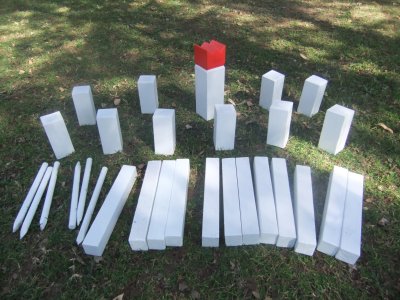
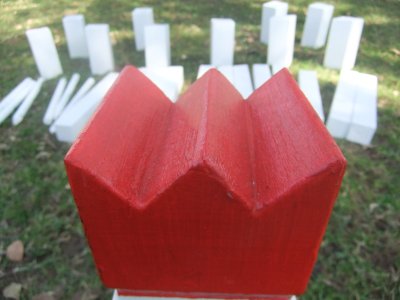
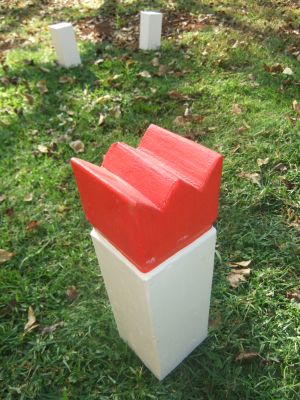
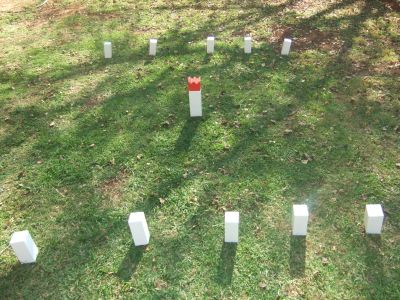
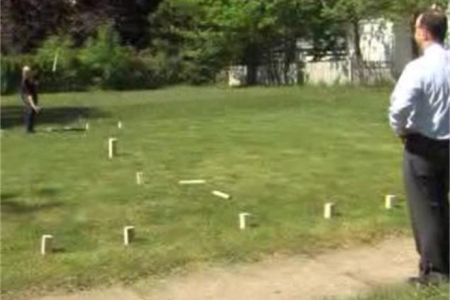
Players:
2 to 12Competititve:
1 vs. 1, unto 6 vs. 6 man teams.Complexity:
5/10Duration:
Medium-LongType:
Game of Skill with hand-eye coordination.Fun Factor
Kubb is a fun mix of skill, strategy, and friendly competition—often called “Viking Chess.”
Players take turns knocking over wooden blocks and try to topple the King to win,
but one wrong throw can end the game early! It’s easy to learn, great for all ages,
and keeps everyone involved from start to finish. Whether at a family picnic or a team event,
Kubb brings people together outdoors for a game that’s both relaxed and exciting.
Game Setup and Rules
Play takes place on a 5 by 8 meter rectangular pitch. Kubbs are placed at
both ends of the pitch, and the "King", a larger wooden block, is placed in
the middle of the pitch.
The ultimate object of the game is to knock over the "kubbs" on the opposing
side of the pitch, and then to knock over the "king", before the opponent does.
Kubb is played between two teams, which may consist of only one person per team.
There are two phases for each team's turn:

Phase 1. Team A throws the six batons from their baseline, at their
opponent's lined-up kubbs (called Baseline kubbs). Throws must be under-handed, and
the batons must spin end over end. Throwing batons overhand, sideways or spinning
them side-to-side (helicopter) is not allowed.
Phase 2. Kubbs that are successfully knocked
down by Team A are then thrown by Team B onto Team A's half of the pitch, and stood on
end. These newly thrown kubbs are called field kubbs. Deciding where in the opponent's
half to throw the field kubbs is a very important part of the strategy. However, the key
objective is to keep them close to each other (as to be able to hit more than one with
a single throw).
If a kubb is thrown out of play, i.e., outside the boundary markers or not beyond the
middle line then one more attempt is given. If this also goes out, the kubb becomes a
"punishment kubb" and can be placed anywhere in the target half by the opposing team as
long as it is at least one baton length from a corner marker or the King. If a thrown
kubb knocks over an existing baseline or field kubb, then the field kubbs are raised at
the location where they rest, and baseline kubbs are raised at their original location.
Play then changes hands, and Team B throws the batons at Team A's kubbs, but must first
knock down any standing field kubbs. If a baseline kubb is knocked down before all remaining
field kubbs, the baseline kubb is returned to its upright position. (Field kubbs that right
themselves due to the momentum of the impact are considered knocked down. Also kubbs are
considered knocked down if they end up tilting and relying on a game piece for support.)
Again, all kubbs that are knocked down are thrown back over onto the opposite half of the
field and then stood.
If either team does not knock down all field kubbs before their turn is over, the kubb closest
to the center line now represents the opposite team's baseline, and throwers may step up to that
line to throw at their opponent's kubbs. This rule applies only to throwing the batons at the
opposite team's field and baseline kubbs; fallen kubbs are thrown from the original baseline,
as are attempts to knock over the king.
Play continues in this fashion until a team is able to knock down all kubbs on one side, from
both the field and the baseline. If that team still has batons left to throw, they now attempt
to knock over the king. If a thrower successfully topples the king, his team has won the game.
If at any time during the game the king is knocked down by a baton or kubb, the throwing team
immediately loses the game.
Included In the Set
1 x King Kubb Piece
10 x Kubbs
12 x Battons
6 x Field Markers
1 x Manual
 see pricelist
see pricelist
 book online
book online
Transport
The Kubb set weighs roughly 10kg, and is usually packed into a single 68L container.
The container dimensions are 61cm (length) by 40cm (width) by 43cm (height) and it can fit into most
hatchback and SUV boots, or easily on the rear seat.
Kubb is a fun mix of skill, strategy, and friendly competition—often called “Viking Chess.”
Players take turns knocking over wooden blocks and try to topple the King to win,
but one wrong throw can end the game early! It’s easy to learn, great for all ages,
and keeps everyone involved from start to finish. Whether at a family picnic or a team event,
Kubb brings people together outdoors for a game that’s both relaxed and exciting.
Play takes place on a 5 by 8 meter rectangular pitch. Kubbs are placed at
both ends of the pitch, and the "King", a larger wooden block, is placed in
the middle of the pitch.
The ultimate object of the game is to knock over the "kubbs" on the opposing side of the pitch, and then to knock over the "king", before the opponent does. Kubb is played between two teams, which may consist of only one person per team. There are two phases for each team's turn:
The ultimate object of the game is to knock over the "kubbs" on the opposing side of the pitch, and then to knock over the "king", before the opponent does. Kubb is played between two teams, which may consist of only one person per team. There are two phases for each team's turn:

Phase 1. Team A throws the six batons from their baseline, at their
opponent's lined-up kubbs (called Baseline kubbs). Throws must be under-handed, and
the batons must spin end over end. Throwing batons overhand, sideways or spinning
them side-to-side (helicopter) is not allowed.
Phase 2. Kubbs that are successfully knocked down by Team A are then thrown by Team B onto Team A's half of the pitch, and stood on end. These newly thrown kubbs are called field kubbs. Deciding where in the opponent's half to throw the field kubbs is a very important part of the strategy. However, the key objective is to keep them close to each other (as to be able to hit more than one with a single throw).
If a kubb is thrown out of play, i.e., outside the boundary markers or not beyond the middle line then one more attempt is given. If this also goes out, the kubb becomes a "punishment kubb" and can be placed anywhere in the target half by the opposing team as long as it is at least one baton length from a corner marker or the King. If a thrown kubb knocks over an existing baseline or field kubb, then the field kubbs are raised at the location where they rest, and baseline kubbs are raised at their original location.
Play then changes hands, and Team B throws the batons at Team A's kubbs, but must first knock down any standing field kubbs. If a baseline kubb is knocked down before all remaining field kubbs, the baseline kubb is returned to its upright position. (Field kubbs that right themselves due to the momentum of the impact are considered knocked down. Also kubbs are considered knocked down if they end up tilting and relying on a game piece for support.) Again, all kubbs that are knocked down are thrown back over onto the opposite half of the field and then stood.
If either team does not knock down all field kubbs before their turn is over, the kubb closest to the center line now represents the opposite team's baseline, and throwers may step up to that line to throw at their opponent's kubbs. This rule applies only to throwing the batons at the opposite team's field and baseline kubbs; fallen kubbs are thrown from the original baseline, as are attempts to knock over the king.
Play continues in this fashion until a team is able to knock down all kubbs on one side, from both the field and the baseline. If that team still has batons left to throw, they now attempt to knock over the king. If a thrower successfully topples the king, his team has won the game.
If at any time during the game the king is knocked down by a baton or kubb, the throwing team immediately loses the game.
Phase 2. Kubbs that are successfully knocked down by Team A are then thrown by Team B onto Team A's half of the pitch, and stood on end. These newly thrown kubbs are called field kubbs. Deciding where in the opponent's half to throw the field kubbs is a very important part of the strategy. However, the key objective is to keep them close to each other (as to be able to hit more than one with a single throw).
If a kubb is thrown out of play, i.e., outside the boundary markers or not beyond the middle line then one more attempt is given. If this also goes out, the kubb becomes a "punishment kubb" and can be placed anywhere in the target half by the opposing team as long as it is at least one baton length from a corner marker or the King. If a thrown kubb knocks over an existing baseline or field kubb, then the field kubbs are raised at the location where they rest, and baseline kubbs are raised at their original location.
Play then changes hands, and Team B throws the batons at Team A's kubbs, but must first knock down any standing field kubbs. If a baseline kubb is knocked down before all remaining field kubbs, the baseline kubb is returned to its upright position. (Field kubbs that right themselves due to the momentum of the impact are considered knocked down. Also kubbs are considered knocked down if they end up tilting and relying on a game piece for support.) Again, all kubbs that are knocked down are thrown back over onto the opposite half of the field and then stood.
If either team does not knock down all field kubbs before their turn is over, the kubb closest to the center line now represents the opposite team's baseline, and throwers may step up to that line to throw at their opponent's kubbs. This rule applies only to throwing the batons at the opposite team's field and baseline kubbs; fallen kubbs are thrown from the original baseline, as are attempts to knock over the king.
Play continues in this fashion until a team is able to knock down all kubbs on one side, from both the field and the baseline. If that team still has batons left to throw, they now attempt to knock over the king. If a thrower successfully topples the king, his team has won the game.
If at any time during the game the king is knocked down by a baton or kubb, the throwing team immediately loses the game.
